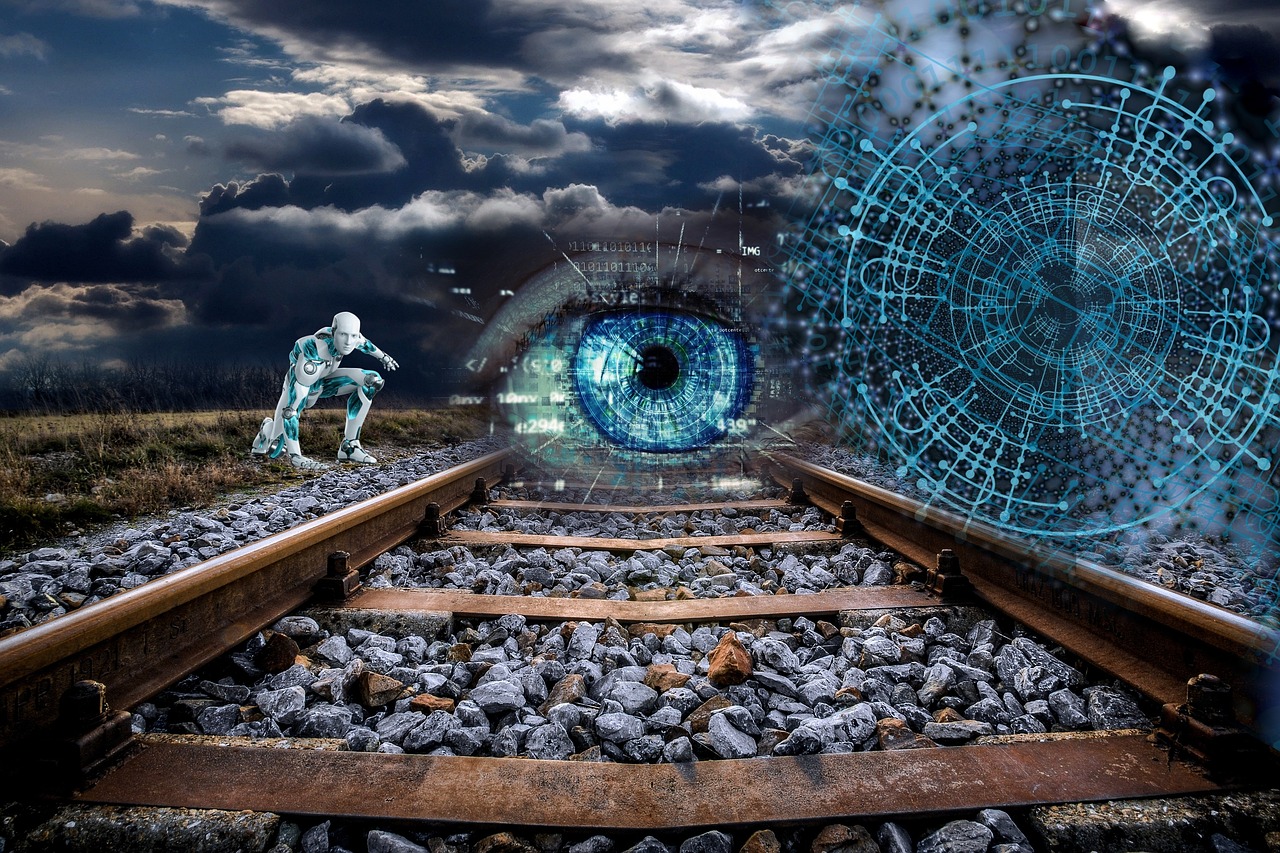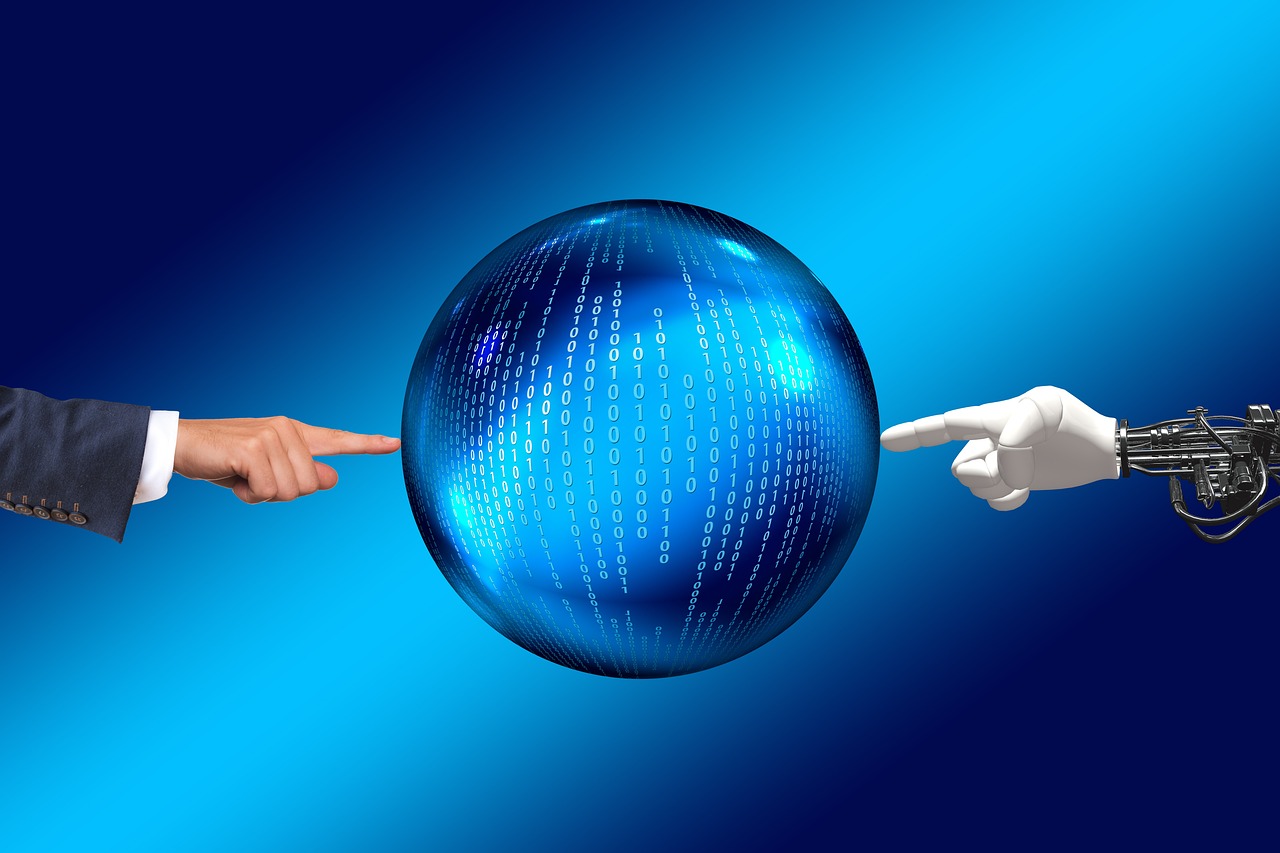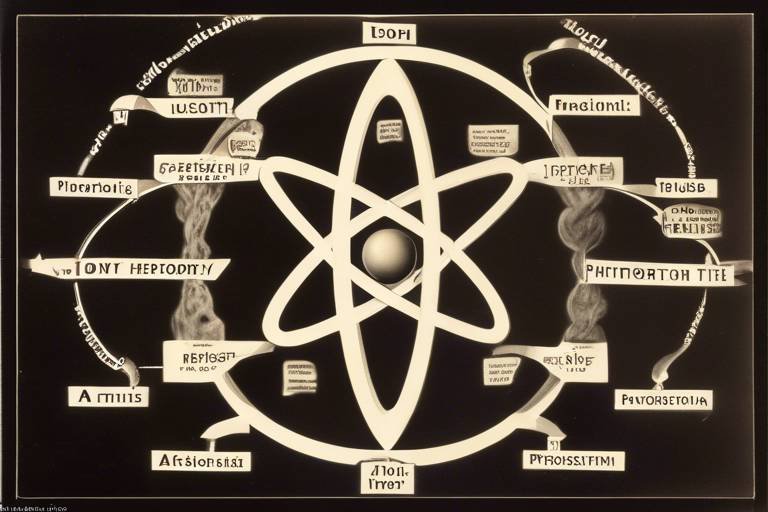The Emergence of Artificial Intelligence: A Philosophical and Scientific Perspective
The world is witnessing an unprecedented transformation with the emergence of artificial intelligence (AI). This phenomenon is not just a technological trend; it represents a profound shift in how we understand intelligence, consciousness, and even our own existence. As we dive into this fascinating topic, we will explore the intricate dance between philosophy and science, revealing how each informs our understanding of AI and its implications for society. The development of AI has sparked a myriad of questions that challenge our traditional notions of what it means to be intelligent and conscious. Are machines capable of understanding? Can they possess emotions? And most importantly, what does this mean for humanity as we continue to integrate these technologies into our daily lives?
To truly appreciate the current advancements in AI, it's essential to take a step back and explore its historical context. The journey of AI began long before the first computer was ever built. In fact, the seeds of AI were planted in ancient philosophy, where thinkers like Aristotle pondered the nature of thought and reasoning. Fast forward to the 20th century, and we see significant milestones such as the creation of the Turing Test by Alan Turing, which sought to determine a machine's ability to exhibit intelligent behavior equivalent to, or indistinguishable from, that of a human. This test was pivotal in shaping the discourse around AI and laid the groundwork for future developments.
As we progressed into the 1950s and 1960s, the field of AI began to take shape with the advent of computer programming and the first neural networks. These early systems were rudimentary compared to today's standards, but they represented a significant leap forward. The 1980s brought about the rise of expert systems, which were designed to emulate the decision-making abilities of a human expert in specific domains. Today, we stand at the crossroads of AI evolution, where machine learning, deep learning, and natural language processing are revolutionizing industries and redefining our interactions with technology.
The rise of AI is not just a technological revolution; it is a philosophical one as well. As we grapple with the capabilities of machines, we must confront profound questions about consciousness, identity, and the very essence of intelligence. What does it mean to be intelligent? Is intelligence merely a set of algorithms and data processing, or does it require a deeper understanding of the world? Philosophers have long debated these questions, and the emergence of AI has only intensified these discussions.
As AI technology continues to evolve, the ethical considerations surrounding its development become increasingly paramount. Developers face moral responsibilities that extend beyond mere programming. The potential consequences of AI deployment can have far-reaching effects on society, raising questions about accountability, transparency, and the societal impact of these technologies. For instance, when an autonomous vehicle makes a decision in a split second, who is responsible for the outcome? The developer, the manufacturer, or the AI itself?
AI systems are increasingly making decisions that affect human lives, from healthcare diagnostics to criminal justice sentencing. This autonomy introduces complex ethical dilemmas. For example, consider a scenario where an AI is tasked with prioritizing patients in a hospital. How does it weigh the value of one life against another? These questions highlight the need for a robust ethical framework that guides AI decision-making processes, ensuring that they align with human values.
Another critical issue in AI ethics is the potential for bias within AI systems. If the data used to train these systems reflects existing societal biases, the AI will inevitably perpetuate them. This challenge raises important questions about fairness and equity in AI algorithms. Developers must actively work to identify and mitigate biases to ensure that AI serves all members of society fairly. The implications of failing to address these issues can lead to discrimination, reinforcing existing inequalities.
AI is not just a tool; it is transforming various sectors, from healthcare to finance, and even education. The integration of AI technologies into these fields is reshaping societal structures and everyday life. For instance, in healthcare, AI can analyze vast amounts of data to assist doctors in diagnosing diseases with remarkable accuracy. In finance, algorithms can predict market trends, offering insights that were previously unimaginable. However, with these advancements come challenges, including job displacement and the need for reskilling in the workforce.
Looking ahead, the future of AI holds both promise and uncertainty. As we continue to develop more sophisticated AI systems, we must consider the implications for humanity. Will AI enhance our capabilities, or will it create new challenges that we are ill-prepared to face? The trajectory of AI technology will largely depend on how we navigate these complexities and the ethical frameworks we establish to guide its development.
The integration of AI into the workforce raises significant questions about job displacement and creation. While some fear that AI will render certain jobs obsolete, others argue that it will create new opportunities that we cannot yet envision. The key lies in how we adapt to these changes. Reskilling and upskilling the workforce will be essential to ensure that individuals can thrive in an AI-driven economy.
As AI technology advances, appropriate governance becomes essential. Current regulatory frameworks are struggling to keep pace with the rapid evolution of AI, highlighting the need for new policies that address its ethical and societal impacts. Governments, industry leaders, and ethicists must collaborate to develop comprehensive regulations that safeguard against potential abuses while fostering innovation.
- What is artificial intelligence? AI refers to the simulation of human intelligence in machines that are programmed to think and learn.
- How does AI impact our daily lives? AI influences various aspects of our lives, including healthcare, finance, education, and entertainment.
- What are the ethical concerns surrounding AI? Key concerns include bias, fairness, accountability, and the implications of machine autonomy in decision-making.
- Will AI take away jobs? While AI may displace certain jobs, it is also expected to create new opportunities that require different skill sets.
- How can we ensure AI is developed responsibly? Establishing ethical frameworks, regulations, and promoting transparency in AI development are crucial steps.

The Historical Context of AI
Understanding the origins of artificial intelligence (AI) is like peeling back the layers of an onion; each layer reveals a deeper insight into how we arrived at today's technological marvels. The journey of AI is not just a story of scientific breakthroughs, but also a reflection of human curiosity and ambition. It all began in the mid-20th century when pioneers like Alan Turing and John McCarthy started to explore the concept of machines that could think and learn. Turing's groundbreaking paper, "Computing Machinery and Intelligence," posed the question, "Can machines think?" This question sparked a wave of interest and set the stage for what we now recognize as AI.
The 1956 Dartmouth Conference is often cited as the official birth of AI as a field of study. It was here that McCarthy, along with other visionaries, coined the term "artificial intelligence." They believed that human-like intelligence could be replicated in machines, and their optimism was infectious. The early days of AI were characterized by the development of simple programs that could perform tasks such as playing chess or solving mathematical problems. These achievements were impressive for their time, but they were just the tip of the iceberg.
As the years progressed, the field of AI experienced its fair share of ups and downs, often referred to as "AI winters"—periods of reduced funding and interest due to unmet expectations. However, the resilience of researchers and the gradual advancements in computer technology kept the flame of AI alive. By the 1980s and 1990s, the introduction of machine learning and neural networks began to shift the paradigm. Researchers started to focus on teaching machines to learn from data rather than just following pre-programmed instructions.
Fast forward to the 21st century, and we are witnessing an explosion of AI applications across various sectors. From self-driving cars to virtual assistants like Siri and Alexa, AI has transitioned from theoretical concepts to practical tools that impact our daily lives. The integration of big data and advances in computational power have further accelerated AI development, enabling machines to analyze vast amounts of information and make decisions in real-time.
To give you a clearer picture, here’s a brief timeline of key milestones in the history of AI:
| Year | Milestone |
|---|---|
| 1950 | Alan Turing publishes "Computing Machinery and Intelligence." |
| 1956 | Dartmouth Conference: The birth of AI as a field. |
| 1966 | ELIZA, an early natural language processing program, is created. |
| 1980s | Rise of expert systems in various industries. |
| 2012 | Breakthrough in deep learning with AlexNet winning the ImageNet competition. |
| 2020s | AI applications become ubiquitous in everyday technologies. |
As we reflect on this historical context, it’s clear that AI is not just a product of technological evolution; it’s also a testament to human ingenuity and the quest for knowledge. Each milestone in its development has paved the way for the sophisticated systems we rely on today. The journey of AI continues, and as we stand on the brink of further advancements, one can only wonder what the future holds. Will we see machines that can not only think but also feel? The possibilities are endless, and the implications for humanity are profound.
- What is the origin of artificial intelligence? AI originated in the mid-20th century, with significant contributions from pioneers like Alan Turing and John McCarthy.
- What was the Dartmouth Conference? The Dartmouth Conference in 1956 is considered the birthplace of AI as a formal field of study.
- What are AI winters? AI winters refer to periods of reduced funding and interest in AI due to unmet expectations.
- How has AI evolved over the years? AI has evolved from simple rule-based systems to complex machine learning and deep learning applications.
- What is the future of AI? The future of AI holds potential for further advancements, including more sophisticated decision-making and emotional intelligence.

Philosophical Implications of AI
The rise of artificial intelligence (AI) has sparked a whirlwind of philosophical debates that challenge our understanding of consciousness, identity, and the very essence of intelligence. As AI systems evolve, they not only perform tasks that were once the exclusive domain of humans but also begin to mirror aspects of our cognitive processes. This leads us to ponder: What does it truly mean to be intelligent? Is intelligence merely the ability to process information and solve problems, or is it something deeper, something that encompasses emotions, self-awareness, and moral judgment?
To dive deeper into these questions, we can explore various philosophical perspectives. For instance, the Chinese Room Argument proposed by philosopher John Searle illustrates a crucial point: just because an AI can manipulate symbols and produce coherent responses doesn't mean it understands them. This argument raises the question of whether machines can ever possess true understanding or consciousness, or if they are merely sophisticated mimics of human behavior.
Another critical aspect to consider is the concept of identity. As AI systems become more integrated into our lives, they start to take on roles that challenge our traditional notions of self. For example, if an AI can create art or compose music, does that mean it has a creative identity? Or is creativity a uniquely human trait that cannot be replicated by algorithms? These questions force us to reevaluate our definitions of identity and creativity in an increasingly digital world.
Furthermore, the implications of AI extend beyond mere definitions. They touch on ethical considerations that are vital for our future. As AI systems become capable of making decisions—some of which can have profound impacts on human lives—we must ask ourselves: What moral responsibilities do developers have? Should AI systems be programmed with ethical guidelines, and if so, whose ethics should they reflect? The challenge lies in the fact that morality is often subjective, varying across cultures and societies.
In contemplating these philosophical implications, we can categorize the discussions into a few key areas:
- Consciousness: Can machines ever achieve self-awareness?
- Identity: How do we define the identity of an AI?
- Ethics: What ethical frameworks should govern AI development?
As we navigate these murky waters, it’s essential to recognize that the evolution of AI is not just a technological revolution; it’s a cultural and philosophical one as well. The questions we ask today about AI will shape our understanding of what it means to be human in the future. In a world where machines can think and act, we must remain vigilant and thoughtful about the implications of their existence.
In conclusion, the philosophical implications of AI are vast and complex, urging us to reconsider our assumptions about intelligence and morality. As we continue to innovate and integrate AI into our lives, we must embrace the challenges and opportunities these discussions present. The dialogue surrounding AI is not just a technical issue; it’s a profound inquiry into the nature of our existence and the future we are creating.
- Can AI ever achieve true consciousness? - While AI can simulate human-like responses, true consciousness involves self-awareness and subjective experience, which remain elusive for machines.
- What ethical considerations should guide AI development? - Developers should consider the potential impacts of AI on society, including fairness, accountability, and the prevention of harm.
- How does AI challenge our understanding of identity? - AI's capabilities in creativity and decision-making force us to rethink what it means to be an individual and how we define creativity.

Ethics in AI Development
The rapid advancement of artificial intelligence (AI) technology has ushered in a new era of possibilities, but it also raises critical ethical questions that we cannot afford to ignore. As developers and researchers push the boundaries of what machines can do, we must pause and reflect on the moral implications of our creations. After all, with great power comes great responsibility, right?
One of the most pressing ethical concerns revolves around the moral responsibilities of AI developers. When creating algorithms that can make decisions impacting human lives, developers must consider the potential consequences of their work. This involves not just technical proficiency but also a deep understanding of the social context in which AI operates. Are we equipping machines with the capability to make life-altering choices without considering the broader implications?
Moreover, the deployment of AI technologies can lead to unintended consequences. For instance, consider a self-driving car that has to make a split-second decision in a potential accident scenario. Should it prioritize the safety of its passengers over pedestrians? Such dilemmas highlight the need for ethical frameworks that guide AI development and deployment. Developers must engage in rigorous discussions about the values embedded in their systems and the potential biases that could arise.
To better understand these ethical dilemmas, let's break down some key areas of concern:
- Accountability: Who is responsible when an AI system makes a mistake? Is it the developer, the user, or the organization deploying the AI?
- Transparency: How can we ensure that AI systems are transparent in their decision-making processes? Users should understand how decisions are made, especially in critical areas like healthcare or criminal justice.
- Privacy: With AI systems often relying on vast amounts of personal data, how do we protect user privacy and ensure consent?
Another significant ethical consideration is the issue of autonomy and decision-making. As AI systems become more autonomous, the question of human oversight becomes increasingly relevant. Should there be limits on how much control we relinquish to machines? This concern is particularly salient in areas such as military applications, where autonomous drones or robots could make life-and-death decisions without human intervention. The potential for misuse or malfunction in these scenarios is alarming, and it underscores the need for strict ethical guidelines.
Furthermore, the challenge of bias and fairness in AI cannot be overstated. AI systems are only as unbiased as the data they are trained on. If the training data reflects societal biases, the AI will likely perpetuate those biases in its decision-making processes. This raises an important ethical question: how do we ensure fairness in AI algorithms? Developers must actively seek to identify and mitigate biases in their datasets, which requires a commitment to diversity and inclusion in both the data collection process and the development teams themselves.
In conclusion, the ethics of AI development is a complex and multifaceted issue that demands our attention. As we navigate this uncharted territory, it's crucial that we foster a culture of responsibility among developers, ensuring that ethical considerations are at the forefront of AI innovation. Only then can we harness the full potential of AI while safeguarding our values and humanity.
Q1: Why is ethics important in AI development?
A1: Ethics is crucial in AI development to ensure that technologies are designed and implemented responsibly, minimizing harm and promoting fairness in decision-making.
Q2: What are the main ethical concerns in AI?
A2: Key ethical concerns include accountability, transparency, privacy, autonomy, and bias in AI systems.
Q3: How can developers ensure fairness in AI?
A3: Developers can ensure fairness by actively identifying biases in their data, involving diverse teams in the development process, and implementing rigorous testing for bias mitigation.

Autonomy and Decision-Making
The rise of artificial intelligence (AI) has ushered in a new era where machines are not just tools but active participants in decision-making processes. This shift raises a plethora of questions about autonomy and the implications of allowing machines to make choices that significantly impact human lives. Imagine a world where your car can decide whether to brake or accelerate based on real-time data, or where algorithms determine the best course of action in a medical emergency. It's both fascinating and frightening!
At the heart of this discussion is the concept of machine autonomy. Autonomy in AI refers to the ability of a system to make decisions without human intervention. While this might sound like science fiction, we are already witnessing its application in various sectors. For instance, autonomous vehicles rely on AI to navigate and make split-second decisions, while AI in finance can analyze market trends and execute trades at lightning speed. But here's the kicker: when machines make decisions, who is responsible for the outcomes? This leads us to a critical juncture in our ethical considerations.
One of the most pressing ethical dilemmas surrounding AI autonomy is accountability. If an AI system makes a mistake—say, an autonomous vehicle gets into an accident—who is to blame? Is it the developer who programmed the AI, the company that deployed it, or the machine itself? These questions are not just academic; they have real-world implications that can affect lives, legal systems, and even corporate reputations. The need for clear guidelines and accountability frameworks becomes increasingly urgent as AI systems gain more autonomy.
Furthermore, the decision-making process of AI raises concerns about transparency. A common analogy used in this context is the "black box" phenomenon. Imagine a magician performing a trick; you can see the spectacle, but you have no idea how it was done. Similarly, many AI systems operate in ways that are not easily understood by humans. This lack of transparency can lead to mistrust among users and stakeholders. To address this, developers must prioritize creating AI systems that not only make decisions efficiently but also provide explanations for those decisions.
Another important aspect of autonomy in AI is the potential for unintended consequences. AI systems learn from data, and if that data is flawed or biased, the outcomes can also be problematic. For example, if a hiring algorithm is trained on historical data that reflects societal biases, it may perpetuate those biases in its decision-making. Thus, ensuring that AI systems are trained on diverse, representative datasets is crucial for ethical autonomy.
In summary, as we navigate the complexities of AI autonomy and decision-making, we must remain vigilant about the ethical implications. The technology holds incredible potential, but with great power comes great responsibility. It is up to us—developers, policymakers, and society at large—to ensure that AI systems are designed and deployed in a manner that prioritizes human values, accountability, and transparency.
- What is AI autonomy? - AI autonomy refers to the ability of artificial intelligence systems to make decisions without human intervention.
- Who is responsible for AI decisions? - Responsibility for AI decisions can fall on developers, companies, or even the AI itself, depending on the context and legal frameworks in place.
- What are the ethical concerns of AI decision-making? - Ethical concerns include accountability, transparency, and the potential for biased outcomes based on flawed training data.

Bias and Fairness in AI
Bias in artificial intelligence is a pressing issue that has garnered significant attention in recent years. As AI systems increasingly influence critical aspects of our lives, from hiring decisions to law enforcement, the potential for biased outcomes becomes a serious concern. But what exactly does it mean for AI to be biased? At its core, bias in AI occurs when the algorithms produce results that are systematically unfair to certain groups of people. This can stem from various sources, including biased training data, flawed algorithms, or even the subjective decisions made by developers during the design process.
To illustrate, consider a hiring algorithm designed to filter job applicants. If the training data used to develop this algorithm predominantly features successful candidates from a specific demographic, the AI may inadvertently favor applicants who match that profile while disadvantaging others. This not only perpetuates existing inequalities but also raises ethical questions about the fairness of using such systems in decision-making processes. In a world striving for equality and inclusivity, the implications of biased AI systems are profound, leading us to question the integrity of the technology we increasingly rely on.
Moreover, the challenge of ensuring fairness in AI is compounded by the lack of transparency in many algorithms. Often described as "black boxes," these systems make it difficult to understand how decisions are reached. This opacity means that even when bias is present, it can be challenging to identify its source or to rectify it. As we move forward, it is crucial to prioritize transparency and accountability in AI development to mitigate these biases.
Addressing bias in AI is not just a technical challenge; it is also a moral imperative. Developers, data scientists, and policymakers must work collaboratively to establish guidelines and best practices for creating fair AI systems. This includes:
- Conducting regular audits of AI algorithms to identify and rectify biases.
- Ensuring diverse representation in training datasets to reflect a wide range of experiences and backgrounds.
- Implementing robust feedback mechanisms that allow users to report biased outcomes.
- Engaging with ethicists and social scientists to understand the broader societal implications of AI deployment.
In conclusion, the journey toward fairness in AI is ongoing and requires a concerted effort from all stakeholders involved. As we strive to harness the power of AI for good, we must remain vigilant against the biases that can undermine its potential. By fostering an environment of inclusivity and accountability, we can work towards a future where AI serves as a tool for equity rather than a perpetuator of discrimination.
Q1: What is bias in AI?
A1: Bias in AI refers to systematic unfairness in the outcomes produced by AI algorithms, often due to biased training data or flawed algorithmic design.
Q2: How can bias in AI be mitigated?
A2: Bias can be mitigated through diverse training datasets, regular audits of algorithms, and incorporating feedback mechanisms for users.
Q3: Why is transparency important in AI?
A3: Transparency is crucial because it helps identify biases in AI systems, allowing for accountability and improvements in fairness.
Q4: What are the ethical implications of biased AI?
A4: Biased AI can perpetuate existing inequalities and discrimination, raising significant ethical concerns about its use in decision-making processes.

The Role of AI in Society
Artificial Intelligence (AI) is not just a buzzword; it's a transformative force reshaping our daily lives and the very fabric of society. Imagine waking up in a world where your morning routine is seamlessly managed by intelligent systems, from your smart coffee maker brewing your favorite blend to your virtual assistant scheduling your day. This isn’t science fiction—it’s our current reality, and it’s only the tip of the iceberg!
AI's role in society spans across various sectors, significantly impacting how we communicate, work, and even think. In healthcare, for instance, AI algorithms analyze vast amounts of medical data to assist doctors in diagnosing diseases more accurately and efficiently. This means faster treatments and potentially saving lives. But how does it affect us beyond the hospital walls? Well, consider how AI is revolutionizing customer service. Chatbots powered by AI are available 24/7, providing instant responses to customer queries. This not only enhances customer satisfaction but also allows businesses to operate more efficiently.
Moreover, AI is making waves in fields like finance, where algorithms can predict market trends and automate trading, leading to more informed investment decisions. The implications are profound: as AI systems take over repetitive tasks, human workers can focus on more complex, creative problem-solving. However, this brings us to a critical crossroads—while AI can enhance productivity, it also raises questions about job displacement. Will machines take over our jobs, or will they create new opportunities? The answer lies in how we adapt to these changes.
To put things into perspective, let’s take a look at some specific areas where AI is making a significant impact:
| Sector | Impact of AI |
|---|---|
| Healthcare | Improved diagnostics and personalized treatment plans. |
| Finance | Automated trading and risk assessment. |
| Education | Personalized learning experiences and administrative efficiency. |
| Transportation | Autonomous vehicles and optimized traffic management. |
| Retail | Enhanced customer experiences and inventory management. |
As we delve deeper into the implications of AI, it’s crucial to recognize that while the technology offers numerous benefits, it also brings challenges that we must address responsibly. The integration of AI into our society prompts us to reflect on our values and priorities. Are we ready to embrace this change, or do we need to tread carefully to ensure that AI serves humanity rather than the other way around?
In conclusion, the role of AI in society is multifaceted and ever-evolving. It holds the potential to enhance our lives in ways we are just beginning to understand. However, as we navigate this new terrain, we must remain vigilant about the ethical implications and strive for a future where technology uplifts humanity. After all, technology should be our ally, not our adversary.
- What are the main benefits of AI in society? AI enhances efficiency, accuracy, and productivity across various sectors, including healthcare, finance, and education.
- Will AI take away jobs? While AI may displace some jobs, it is also expected to create new opportunities that require human skills and creativity.
- How can we ensure ethical AI development? By establishing clear guidelines, promoting transparency, and involving diverse stakeholders in the development process.
- What is the future of AI in everyday life? AI is likely to become more integrated into our daily routines, making tasks easier and more efficient while also presenting new challenges.

The Future of AI Technology
The future of Artificial Intelligence (AI) is a topic that ignites both excitement and apprehension. As we stand on the brink of what many call the Fourth Industrial Revolution, AI is poised to reshape the very fabric of our society. Imagine a world where machines not only assist us but also predict our needs and enhance our capabilities. This isn’t just science fiction; it’s rapidly becoming our reality. But what does this mean for our future?
First off, the potential advancements in AI technology are staggering. From healthcare breakthroughs to autonomous vehicles, the applications are vast and varied. For instance, AI algorithms are already being used to analyze medical data, leading to earlier diagnoses and more personalized treatment plans. This could revolutionize how we approach health care, making it not just reactive but proactive. However, with great power comes great responsibility. As we harness these technologies, we must also navigate the ethical landscape they create.
One of the most pressing concerns is the impact of AI on employment. While AI has the potential to create new job opportunities, it also threatens to displace many traditional roles. For example, consider how automation in manufacturing has already changed the job market. Many fear that as AI continues to evolve, we could see a significant shift in labor dynamics. According to a recent study, it’s estimated that up to 40% of jobs could be affected by AI in the next two decades. This raises critical questions: How do we prepare the workforce for these changes? What skills will be in demand?
Furthermore, the governance and regulation of AI technology are essential for ensuring its ethical deployment. As AI systems become increasingly autonomous, we must establish clear frameworks to manage their integration into society. Currently, various countries are developing regulations to address these issues, but there is still much work to be done. A global consensus on AI governance could help mitigate risks and ensure that AI serves humanity's best interests.
In this rapidly changing landscape, it's vital to remain informed and engaged. The future of AI is not solely in the hands of technologists; it involves policymakers, ethicists, and the general public. We all have a role to play in shaping how AI will affect our lives. By fostering open discussions and encouraging interdisciplinary collaboration, we can ensure that AI evolves in a way that benefits everyone.
As we look ahead, we must also consider the societal implications of AI. Will we see a world where technology enhances our human experience, or will it create a divide between those who can adapt and those who cannot? The answer lies in how we choose to embrace and guide these advancements. The future of AI technology is not predetermined; it is a path we can shape through our choices today.
- What are the main benefits of AI technology? AI can enhance efficiency, improve decision-making, and provide personalized experiences across various sectors.
- How will AI impact job markets? While AI may displace certain jobs, it is also expected to create new roles that focus on managing and improving AI systems.
- What ethical concerns are associated with AI? Key concerns include bias in AI algorithms, privacy issues, and the moral implications of machine decision-making.
- How is AI regulated? Different countries are developing their regulatory frameworks, focusing on ethical use, safety, and accountability in AI systems.

AI and Employment
The integration of Artificial Intelligence (AI) into the workforce is a double-edged sword, sparking debates that echo through boardrooms and coffee shops alike. On one hand, AI promises to revolutionize industries, streamline operations, and enhance productivity. On the other hand, it raises critical questions about job displacement and the future of work. As we stand on this precipice of change, it’s essential to examine both sides of the coin—what jobs might be lost, and what new opportunities could arise?
To understand the impact of AI on employment, let’s first acknowledge the sectors most likely to be affected. For instance, jobs involving repetitive tasks, such as data entry or assembly line work, are particularly vulnerable to automation. However, this doesn’t mean that AI will simply wipe out jobs; rather, it may transform them. Think of it like a caterpillar turning into a butterfly. The roles may evolve, requiring new skills and adaptability, but they won’t necessarily disappear.
Consider the following key areas where AI is making waves:
- Manufacturing: Automation is streamlining production lines, allowing for faster output.
- Healthcare: AI assists in diagnostics and patient management, freeing up healthcare professionals to focus on patient care.
- Finance: Algorithms analyze market trends and make trading decisions, reshaping the financial landscape.
While these advancements can lead to increased efficiency, they also necessitate a shift in workforce skills. Workers may need to adapt to new technologies, requiring ongoing education and training. In fact, a report by the World Economic Forum predicts that by 2025, 85 million jobs may be displaced due to the rise of AI, but at the same time, 97 million new roles could emerge that are more suited to the new division of labor. It’s a paradox that emphasizes the importance of reskilling and upskilling.
Another critical aspect to consider is the emotional intelligence that AI cannot replicate. Jobs that require human interaction, empathy, and creativity—like those in teaching, counseling, and the arts—are less likely to be replaced by machines. Instead, AI can be a tool that enhances these roles, allowing professionals to focus on what they do best while handling mundane tasks.
As we navigate this landscape, it’s crucial for businesses, governments, and educational institutions to collaborate. They must create frameworks that facilitate this transition, ensuring that workers are equipped with the necessary skills to thrive in an AI-driven economy. This could involve:
- Developing training programs that focus on digital literacy.
- Encouraging lifelong learning to adapt to changing job requirements.
- Implementing policies that support workers during transitions.
In conclusion, while the rise of AI presents challenges in terms of employment, it also opens doors to new possibilities. The key lies in embracing change and fostering an environment where humans and machines can coexist and collaborate. Just like any major technological shift in history, such as the Industrial Revolution, the rise of AI will redefine our roles in the workforce, and it’s up to us to shape that future.
Q: Will AI completely take over my job?
A: Not necessarily. While AI may automate certain tasks, it often enhances human roles rather than replacing them entirely. Many jobs will evolve to require new skills alongside AI technologies.
Q: What types of jobs are most at risk due to AI?
A: Jobs that involve repetitive, predictable tasks—such as data entry, manufacturing, and some customer service roles—are more susceptible to automation.
Q: How can I prepare for the changes AI will bring to the job market?
A: Focus on developing skills that AI cannot replicate, such as emotional intelligence, creativity, and complex problem-solving. Additionally, seek out training programs that enhance your digital skills.
Q: Are there any jobs that AI will not be able to replace?
A: Yes, jobs that require human interaction, empathy, and creativity, such as those in healthcare, education, and the arts, are less likely to be replaced by AI.

AI Governance and Regulation
The rapid advancement of artificial intelligence (AI) technology has ignited a pressing need for effective governance and regulation. As AI systems become increasingly integrated into our daily lives, the implications of their use raise significant questions about accountability, transparency, and ethical considerations. It's not just about making machines smarter; it's about ensuring that these machines operate within a framework that prioritizes human values and societal well-being. Imagine a world where AI governs critical decisions without oversight—scary, right?
To address these challenges, various stakeholders, including governments, tech companies, and civil society, must collaborate to create robust regulatory frameworks. These frameworks should focus on several key areas:
- Accountability: Who is responsible when an AI system makes a mistake? Clear lines of accountability must be established to ensure that developers and organizations can be held responsible for their AI systems.
- Transparency: Users should understand how AI systems make decisions. This involves demystifying algorithms and providing insights into their functioning.
- Public Engagement: Engaging the public in discussions about AI governance is crucial. This ensures that diverse perspectives are considered, especially those of marginalized communities who might be disproportionately affected by AI technologies.
Moreover, the need for international cooperation cannot be overstated. AI does not respect borders; a decision made in one country can have ramifications globally. Therefore, developing international standards and agreements on AI governance is essential. For instance, organizations like the European Union are already taking steps to establish guidelines for AI ethics and regulation. The proposed AI Act aims to create a legal framework that categorizes AI applications based on their risk levels, thus ensuring that high-risk systems undergo stringent assessments before deployment.
Additionally, the concept of ethical AI is gaining traction. This refers to the development of AI systems that prioritize fairness, accountability, and transparency. Companies are increasingly recognizing the importance of embedding ethical considerations into their AI development processes. This involves implementing practices such as bias detection and mitigation, as well as ensuring diverse teams are involved in AI design and deployment.
To illustrate the current landscape of AI governance, consider the following table that summarizes various regulatory initiatives around the world:
| Region | Initiative | Description |
|---|---|---|
| European Union | AI Act | A proposed regulation categorizing AI applications based on risk levels, with strict requirements for high-risk systems. |
| United States | Algorithmic Accountability Act | Proposed legislation requiring companies to assess the impact of automated decision-making systems. |
| China | AI Development Plan | A national strategy aimed at becoming a global leader in AI by 2030, with guidelines on ethical AI development. |
In conclusion, the governance and regulation of AI are not merely bureaucratic necessities but rather essential elements for fostering trust and safety in AI technologies. As we continue to innovate, it's imperative that we do so with a keen awareness of the ethical implications and a commitment to creating a future where AI serves humanity, rather than undermines it. The road ahead may be complex, but with collaborative efforts and a focus on ethical principles, we can navigate the challenges that lie ahead.
Q1: Why is AI governance important?
AI governance is crucial to ensure accountability, transparency, and ethical use of AI technologies, protecting society from potential risks and biases.
Q2: What are the main challenges in AI regulation?
The main challenges include the rapid pace of technological advancement, the complexity of AI systems, and the need for international cooperation.
Q3: How can individuals contribute to AI governance?
Individuals can engage in public discussions, advocate for ethical AI practices, and support organizations that prioritize responsible AI development.
Frequently Asked Questions
- What is artificial intelligence (AI)?
Artificial intelligence (AI) refers to the simulation of human intelligence in machines that are programmed to think and learn like humans. These systems can perform tasks such as recognizing speech, making decisions, and solving problems.
- How did AI develop historically?
The development of AI has roots in ancient history, but it gained momentum in the mid-20th century with key milestones such as the creation of the first computers and the development of algorithms that mimic human thought processes. Significant advancements have been made over the decades, leading to the sophisticated AI systems we see today.
- What are the philosophical implications of AI?
The rise of AI prompts deep philosophical questions about consciousness, identity, and what it means to be intelligent. It challenges our understanding of human cognition and raises issues about the nature of intelligence itself, blurring the lines between human and machine capabilities.
- What ethical considerations are involved in AI development?
As AI technology evolves, ethical considerations become crucial. Developers must consider the moral responsibilities associated with creating AI systems, particularly concerning privacy, accountability, and the potential consequences of their deployment in society.
- How does AI affect autonomy and decision-making?
AI systems increasingly influence decisions that impact human lives, leading to ethical dilemmas regarding machine autonomy. The implications of allowing machines to make critical decisions challenge our traditional views on responsibility and control.
- What are the challenges of bias and fairness in AI?
AI systems can inadvertently perpetuate biases present in their training data, leading to unfair outcomes. Ensuring fairness and equity in AI algorithms is a significant challenge that requires ongoing attention and corrective measures.
- How is AI transforming society?
AI is revolutionizing various sectors, including healthcare, finance, and education. Its integration into these fields is reshaping societal structures, enhancing efficiency, and creating new opportunities while also presenting challenges that need to be addressed.
- What does the future hold for AI technology?
The future of AI is filled with promise and uncertainty. As technology continues to evolve, we can expect advancements that will further integrate AI into our lives, raising questions about ethical governance and the implications for humanity.
- Will AI impact employment opportunities?
The integration of AI into the workforce raises concerns about job displacement, but it also creates new job opportunities. The balance between these effects will significantly shape employment trends and labor markets in the coming years.
- What is the role of governance and regulation in AI?
As AI technology advances, effective governance and regulation become essential to manage its ethical and societal impacts. Current regulatory frameworks are evolving to address the challenges posed by AI, ensuring that its development aligns with societal values and norms.



















